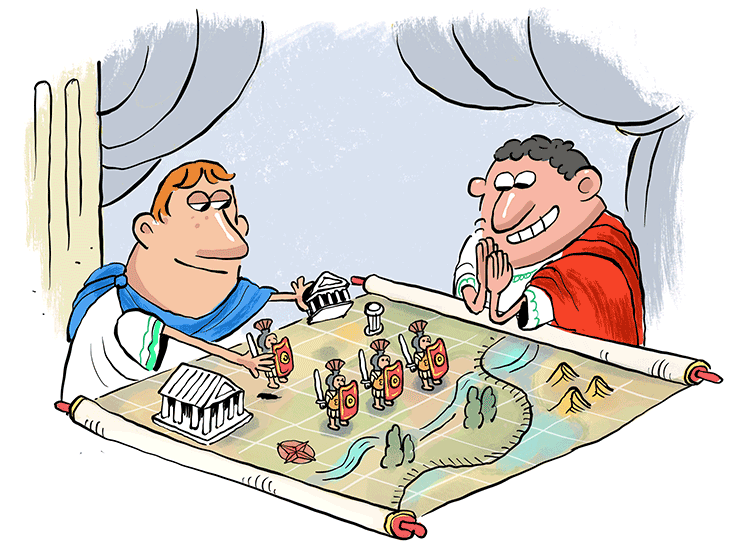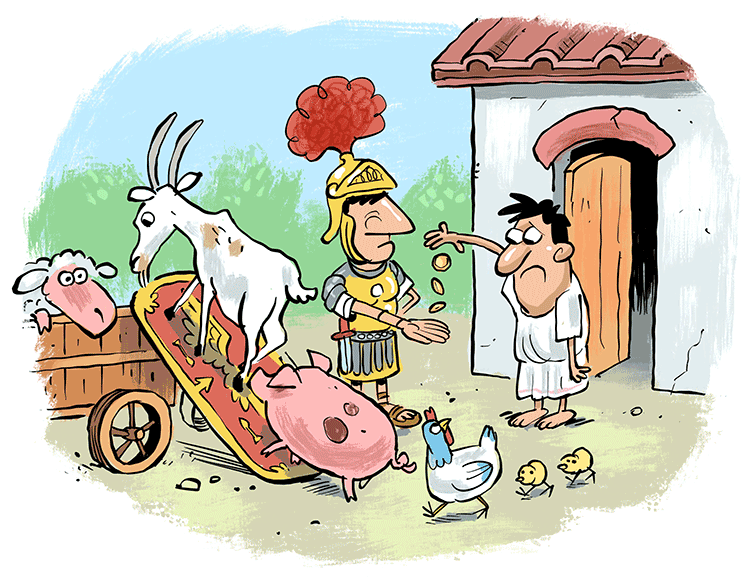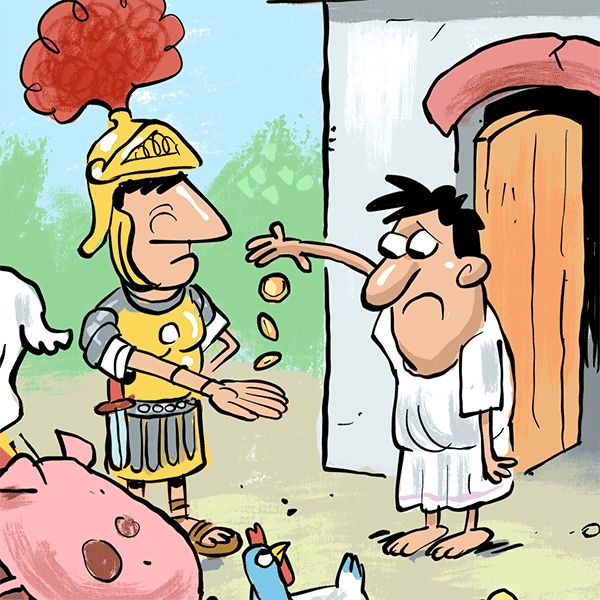Government and civilization have always been tied together. While philosophers have long debated its role, the reality is that a civilization advances more when there is a strong, effective government to help manage its affairs.
The history of ancient Rome spans more than 1500 years, from its founding in the 8th century BC all the way up until the fall of the Western Roman Empire in 476 AD. During this time, the shape and nature of its government changed dramatically. But in the process, it helped lay the groundwork for many modern governments.
Rome as a Republic
When Rome was founded, it was a monarchy, meaning it was ruled by one king. But this didn’t last very long. By the fifth century BC (400-499 BC), the monarchy had been overthrown and replaced with a republic.
By definition, a republic is a form of democratic government in which the people elect representatives to make decisions for them. It’s similar to a democracy, which has the people themselves vote on laws and other matters of the date. And it’s also the preferred form of government for nearly all democracies today.
The Roman republic was ruled mainly by the Senate, which was a group of aristocratic elites that dictated the affairs of Rome, especially those in foreign lands where conquest was the goal.
Over time, however, the upper class had to give up some of its power. Pressure from other social groups, mainly the plebians, aka the commoners, forced the Senate to relinquish some of its power and create additional bodies that could veto Senate decisions.
While admission to the Senate was granted by the Senate itself, many political offices in Rome were elected. The people had a say in who would run the city, and winning one of these offices often led to Senate membership.
This helped make Rome more democratic, but it also made it more difficult to control. Individuals who were popular with the masses (or the soldiers) could wield a lot more power than their specific office actually had.
This disrupted the whole process and led to lots and lots of infighting. Many conflicts eventually led to civil wars, which dominated much of early Roman history.

The Roman Consuls
As Rome grew, it became harder and harder for the Senate, which at any point in time had hundreds of members, to manage the affairs of the state. Think about when you try to do something with friends: the larger the group, the harder it is to agree.
To solve this, the Senate began appointing consuls, which were kind of like presidents. These individuals would serve a one-year term and be in charge of making most of the decisions related to the Roman state. They were usually given an army to command, as well, and this brought considerable power in its own right.
In the beginning, the Senate would tell the consuls what to do by issuing senatus consulta. Over time, these orders became recommendations. But the consuls nearly always followed them. Not doing so would cause them to lose favor and later their job. Eventually, though, even this tradition broke and the consulship became an increasingly powerful position that everyone wanted.

Rome as an Empire
After operating as a republic for nearly 400 years, Rome had become too large and the republican nature of its government started to deteriorate. Things came to a head in the middle of the first century BC when Julius Caesar, who at the time was a Senator and also an extremely popular military commander, defeated his political rivals in battle and earned himself the title dictator perpetuo, which means dictator for life.
Most historians mark this moment, the year 44 BC to be exact, as the moment when Rome officially transformed from a republic to an empire.
However, by definition, an empire exists when power is mostly consolidated into the hands of one person, and it’s usually handed down to a hand-picked successor. This didn’t really happen in Caesar’s case.
His death, which was an assasination by those who believed he was trying to steal Rome away from the Senate, launched another civil war. His adopted nephew, Octavian, won and took the title Augustus Caesar, which many future emperors would also use.
Most historians agree that Augustus was the first true Roman emperor.
However, to make his claim legitimate, Augustus had to play ball with the Senate. Officially, his power was granted by them, and the Senate still played a role in decision making. But the importance of the Senate would gradually decline until it served not much more than a symbolic role in the later chapters of Roman history.
The Roman Provinces
One of the big achievements of the Roman government was its ability to administer its empire. With its territories stretching from Britain and Spain in the west to Syria and Iraq in the east, there was a lot of land, and a lot of people, to try and govern.
The Romans did this by dividing their empire into a number of different provinces. Then, each province was governed by a magistrate. In the early days, this magistrate was chosen by the Senate but later it was chosen by the emperor.
No matter who gave them the power, provincial magistrates were responsible for collecting taxes and tributes (which are kind of like taxes but taken by force rather than given voluntarily) and enforcing Roman laws. They were usually given an army to command, which they could use to defend their province or, depending on their influence, conquer new lands in the name of Rome. This task, however, was usually the emperor’s.
Setting up the government in this way made the empire easier to manage. But it also helped contribute to a stronger Roman identity. People in the provinces weren’t just paying tribute to some faraway land. Add in the fact that many Roman citizens and soldiers began moving and settling in the province and now you have a population that lives very far from the city of Rome but that also feels Roman.
This is one of the many reasons why the Roman empire existed as long as it did and was able to control as much territory as it did.

Ruling with Fear
While the Romans were quite good at administration and bureaucracy, we must never forget the importance of fear. The ancient world was a treacherous place. A true dog eat dog world. And the one with the biggest stick often held power.
The Roman military, starting from the early days of the Republic, through training and better weapons, was feared across the ancient world. Don’t want to pay taxes? No worries. We’ll just invade. Oh, you think you can be independent from Rome? We’ll see you on the battlefield. And if you dared defy Rome and lost, forget about it. You’d be sold into slavery, assuming you were left alive.
Of course, the Romans lost plenty of battles throughout their time on top of the ancient world. But their enemies were never unified enough to break Rome’s grip on power, and the general rule of thumb was to not mess with them. The consequences were too great.
Ultimately, this probably contributed to Rome’s demise.
As the Germanic tribes from the north began running from the Huns, an Asian group that invaded Europe in the 4th century, they didn’t have a lot of reasons to be nice to the Roman citizens living on the land they now needed to occupy. In the past, Rome would have fought them back. But by this time it was too weak and Rome could no longer exert its power through military might.
Rome as a Military Dictatorship
In the end, it’s impossible to break the link between Roman political and military power. While its bureaucracy helped make its empire possible, power was ultimately wielded by the strongest, i.e the one who controlled the largest army.
Throughout the imperial period, power frequently changed hands and there were several wars of succession as different political entities fought for absolute control.
Once in power, no one could last unless they maintained control over the military, which often required bribes and lots of special treatment that ultimately became unsustainable.
For this reason, Rome, for most of its history, was really just a military dictatorship. An authoritarian government controlled (mostly) by the most powerful general.
Building the Modern World
Roman government changed shape and form throughout history. But despite changing a lot, it still helped lay the groundwork for the modern world. Roman provinces split up and organized vast stretches of land. And while borders changed throughout the years, these provinces wound up being outlines for modern nations.
The province of Gaul looks an awful lot like France, and Britannia, unsurprisingly, became the modern nation of Britain. And don’t forget about Hispania, which is where Spain and Portugal now exist.
Roman methods of tax collection and provincial government lasted for hundreds of years after the fall of Rome. The Latin language led to the creation of the Romance languages (Spanish, French, Italian, Portuguese, and Romanian, among others) and this made it even easier for former Roman provinces to come together and form what we would call countries.
Plus, its original form of government, the republic, has served as a model for many modern governments. In fact, the US constitution, written in 1787, directly references the Roman republic and was designed, in part, to emulate the Romans.
So, while they weren’t perfect and struggled endlessly to keep their empire alive and intact, the Romans played an essential role in creating the world we live in today.
Written by Matthew Jones
Illustrated by Jean Galvao
